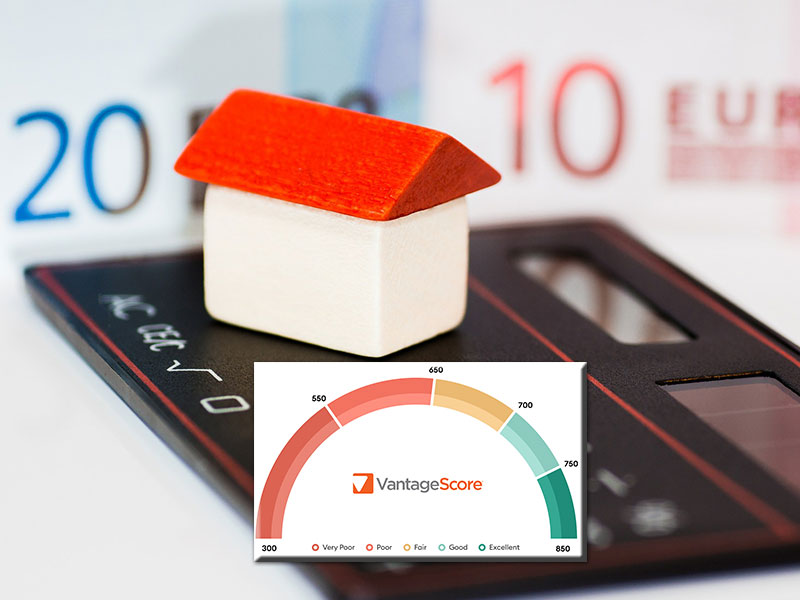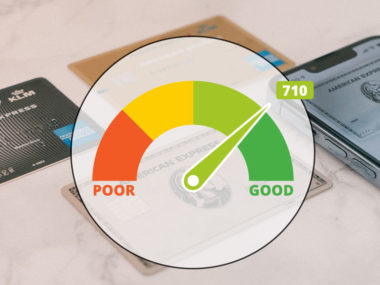
If you’re like most people, you probably think that your mortgage credit score is the same as your FICO score. Unfortunately, this isn’t always the case. Creditors use scoring models specific to their industries, and this is especially true of mortgage lenders.
After all, home loan lenders provide the largest loans most people ever have. Consequently, your mortgage score incorporates different factors and could be lower than your regular score.
A lower credit score could make it difficult or impossible to qualify for the mortgage terms and rates you prefer. In some cases, you might not qualify for a loan at all. The good news is that if you take the time to understand why your mortgage score differs, you find yourself in a much better position to improve your score and get the home you desire.
Table of Contents
What Are Industry-Specific Credit Scores?
These credit scores are usually based on the FICO score calculation. However, they may also include other factors that are specific to that industry. For example, a mortgage score might include information about your mortgage history, while an insurance credit score might include information about your driving record.
What Is Your Mortgage Credit Score?
Mortgage lenders use this to determine the level of risk your loan introduces to their organizations. A high credit score corresponds with low risk and a low mortgage score corresponds with high risk. Most mortgage lenders prefer a credit score above 720.
Anything below that leads to higher interest rates. Rates are highest for scores under 629. This can cost you thousands over the life of the mortgage loan.
Over the years, the federal government and state agencies have introduced several programs to make homes more affordable for lower-income households. Even so, if your credit score is lower than 580, you might have a difficult time getting approved for a mortgage at all. This is especially the case during economic uncertainty and for people who have more variable incomes.
What Are the Main Mortgage Credit Scores?

For many years, most mortgage lenders focused primarily on the use of special FICO Models. According to Experian, these FICO scores include the following:
- Experian/Fair Isaac Risk Model v2 or FICO® Score 2
- TransUnion FICO® Risk Score 04 or FICO® Score 4
- Equifax Beacon 5 or FICO® Score 5
In most instances, the mortgage lender receives one credit report with information from all three credit bureaus and FICO scoring models. Some lenders reportedly may use the lower score. However, Experian reports that the middle score is more likely. When two people apply together, lenders use the lower middle score.
Over the years, however, some lenders have also started to use VantageScore. This has two scoring models: the 3.0 model and the 4.0 model.
How Does the FICO Mortgage Credit Score Compare to VantageScore?
The main difference between scoring models comes down to what each algorithm gives weight to. For example, some scoring models choose not to give a lot of weight to personal loans or medical bills, while some do.
FICO Credit Score
FICO credit score is the most common credit score used by lenders across virtually all industries. This number is calculated based on your credit history, including how often you have applied for new credit and how timely you have made your payments. The higher your FICO score, the better interest rate you will get from lenders.
VantageScore
The three major credit bureaus — Experian, Equifax and TransUnion — jointly developed VantageScore. Its mortgage credit score is based on the same factors as the FICO score, but it weighs some items differently.
FICO vs. VantageScore
FICO and VantageScore are like the Google Search and Bing of the finance world. They serve exactly the same purpose, but they are strong competitors using different algorithms to arrive at the best answer. While many lenders prefer VantageScore, FICO has cornered a whopping 90% of the lender market for itself. Here are some important differences to note:
- VantageScore may give more weight to your recent credit history than the FICO score.
- Whereas FICO requires that you hold a tradeline for at least six months to get a credit score, VantageScore gives you a score with a tradeline of any age.
- While both credit score options range from 300 to 350, the models differ on what counts as a poor, good or excellent score.
- FICO rewards 150 points to a credit report with no delinquencies, but VantageScore gives 155 points for the same achievement.
Why Is Your Mortgage Credit Score Lower Than Your FICO Credit Score?
If you discover you have a lower mortgage score than your regular FICO credit score, that’s because mortgage lenders look at different factors. Here are some additional factors mortgage lenders use that many other industries do not:
- Your monthly income
- Your income over a certain period, such as two years
- Whether you had previous mortgages and the standing of those loans
- How long you have had a credit score
- Whether you have had an installment loan or a loan with a large balance
What Are the Best Mortgage Programs for Lower Mortgage Credit Scores?
There is no doubt that owning your home is a much better financial investment than renting. Even so, finance gurus recommend that homeowners do everything they can to improve their credit scores before seeking out a home loan.
Aspiring homeowners need to weigh the pros and cons of buying a home with a lower mortgage credit score now versus rising home costs. Remember that you can always refinance later. With that in mind, consider the following options.
VA Home Loan
Did you know the U.S. Department of Veterans Affairs sets no minimum credit score to get a VA home loan? Private lenders do set a minimum, but people who shop around have secured home loans with scores as low as 500.
The VA Home Loan is a mortgage program offered to veterans and active-duty military personnel. This mortgage program does not require a down payment, which makes it ideal for borrowers who are low on cash.
Additionally, mortgage lenders are required to offer mortgage loans under this program to all eligible borrowers. Even without this requirement, mortgage lenders tend to exercise more leniency towards military persons.
FHA Home Loan
If you are not a military person or qualifying spouse, the FHA loan provides an excellent alternative. Like the VA loan, it is backed by the federal government. This makes some lenders more willing to exercise leniency when determining the mortgage credit score that qualifies future borrowers.
One of the perks of the FHA loan is that it is assumable. This means that someone else can take over the payments without going through the entire approval process again. It does not eliminate the entire process of confirming creditworthiness, but it does simplify it.
FHA loans also only require a 3.5% down payment. First-time buyers and homeowners in lower-income brackets should consider all their options for getting assistance before tapping into savings for this cost.
USDA Home Loan
Did you know that 83% of America’s population lives in cities? To reduce this mass migration out of the countryside, the federal government provides the USDA loan to make rural development even more affordable and accessible. For starters, this mortgage program does not require a down payment.
Additionally, the interest rates on USDA mortgage loans are typically lower than the interest rates on other mortgage programs. While it may require a slightly higher score than the other two federally backed loans, lower costs of homes in rural areas make it easier to secure affordable monthly payments.
What Can You Do To Improve Your Mortgage Credit Score?
Sadly, many aspiring homebuyers only realize how low their mortgage credit scores are when applying for their home loans. Thankfully, there are many ways to review and improve your credit score before applying for a mortgage. Ideally, you do these things at least six months before the time you plan to apply.
1. Review Your Credit Report
Because your mortgage lender will review credit information from all three major credit bureaus, you should too. This reduces the risk of surprises during the loan underwriting process. U.S. tax filers are entitled to one free copy of their credit reports from each credit bureau every 12 months.
Review the information in your report and look for inaccurate or outdated information. Dispute inaccurate information with the credit bureaus.
2. Automate Your Bills
One of the best ways to boost your mortgage credit score is to make sure that you always pay your bills on time. Mortgage lenders use payment history as a predictor of whether you might default on the home loan. In fact, payment history makes up 35% of your credit score for the FICO model.
Automating your bills eliminates the risk of forgetting to pay them on time. If you sometimes run short on cash, be sure to use a checking account that does not have overdraft fees.
3. Diversify Your Credit Mix
Credit falls into two main categories: revolving credit and installment credit. Revolving credit includes credit cards, even the ones that allow installment payments, such as the Amazon Prime card. Installment loans have a definite end date of the loan and specific monthly payments, such as a car loan or student loans. Your credit mix makes up 10% of your FICO credit score.
When you have never had an installment loan, some lenders automatically treat your mortgage credit score as sub-700. This stems from the fact that you have no experience with paying installments. You can sometimes avoid this by getting a credit builder loan from your local credit union.
4. Reduce Your Debts
Carrying high debt makes you a risky buyer. Lenders feel especially cautious about certain types of debts. For example, a lender might see student loans or a reasonable car loan as good debt. However, credit cards do not receive the same treatment.
Consequently, most finance gurus recommend paying off your credit cards before seeking a mortgage loan. Consider these methods to manage your debt:
- Pay off your credit card balance at the end of every month.
- Keep your credit card usage under 10% for each card.
- Avoid taking on any new debt, such as a car loan, in the year leading up to your mortgage application.
5. Minimize Credit Pulls
When you seek pre-approval, most lenders conduct a soft pull. This has no effect on your mortgage credit score and provides basic information to get an idea of your credit position.
A hard pull shows on your credit report and can also cause your credit score to fall temporarily. Always ask which type a lender intends to do before giving permission or signing paperwork.
Ideally, you should have only two to three hard pulls in your credit history per year. Keep in mind that these remain on your credit report for two years. When shopping around for good rates, multiple hard pulls might become necessary. VantageScore counts the ones that occur within a 14-day period as one. FICO extends that range to 45 days.
6. Wait After Bankruptcy
You can get a home loan even if you filed for bankruptcy within the past few years. The final decision comes down to the private lender and the type of mortgage program. A bankruptcy filing remains on your credit report for up to 10 years. Review the waiting periods before making a decision. It differs for the type of bankruptcy and across all mortgage loan types.
7. Seek Credit Repair Services
Sometimes, your credit has taken so many hits that you need a little extra help to get it back in shape. Consider seeking out professional credit repair services to get help. Professionals evaluate your unique situation and craft a solution that meets your needs. It might cost you to rebuild this way, but the benefits of better credit far outweigh the fees.
The sooner you start working on repairing your mortgage credit score, the sooner you can access a wide range of opportunities. Join our mailing list to get access to even more credit-building tips and resources.





